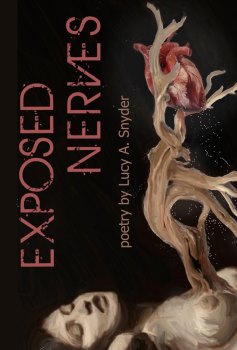 Exposed Nerves by Lucy A. Snyder
Exposed Nerves by Lucy A. Snyder
Raw Dog Screaming Press (September 2021)
114 pages; paperback $12.95; $5.99 e-book
Reviewed by Joshua Gage
Exposed Nerves is a collection of feminist horror poems, mostly in the narrative or lyric vein. Lucy A. Snyder excels at taking a known trope — the big bad wolf in “Wolf Waltz” or rapists in “My Neighbor Defends Her Champion” — and flipping the perspective. A lot of these poems use their subjects to make social commentary, which is one of the main purposes of horror. Snyder often takes the women in her poems and allows them to triumph over evil. In “turnt,” for example, a teenage girl is lured into a older boy’s automobile until she can’t help but turning into a ferocious beast:
pulse hammering inside the secluded car
skin splitting over hairy muscle, scarlet claws
and he’s screaming, wailing like he’s burning
Here the hunted becomes the hunter, and while the idea of a teenage werewolf is certainly nothing new, Snyder’s imagery and metaphorical language makes the redemptive story fresh and interesting for readers.
There are times when Snyder’s poems, however, seem to teeter into weak craft decisions. “The Unforgiving King,” for example, has stanzas that seem based on a haiku “syllable count” (which is, of course, a linguistic misunderstanding that has been disputed and disproven by poetry scholars) but show no understanding of how the haiku form works. “The Invisible Woman,” a poem written with Gary A. Braunbeck, suffers from weak lines and poorly executed line breaks, but its strong imagery and overriding metaphor overwhelm its flawed structure. How much of this is Snyder’s fault or just poor curation or editing one can’t tell, but these flaws are few and far between, and the collection doesn’t suffer greatly because of them.
Overall, Exposed Nerves by Lucy A. Snyder is a relatively strong collection of feminist horror poems. While there are a few misses, most of the poems stand up to scrutiny and the overarching themes within the collection — angry defiance against a threatening patriarchy and a thirst for revenge and justice — are current and necessary. This is a solid collection of horror poetry which readers will very much enjoy.



